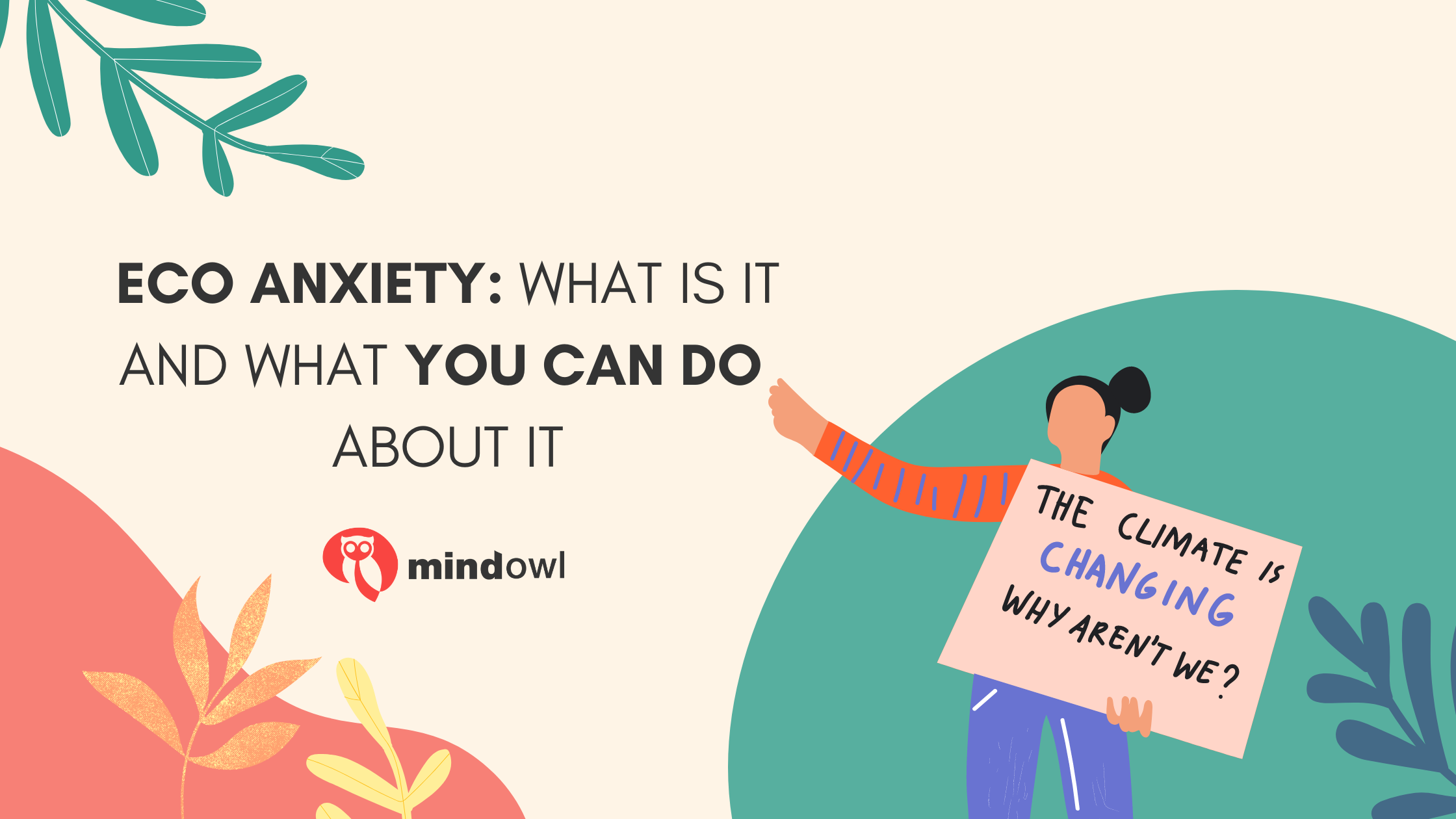The climate emergency is the biggest existential crisis humanity has ever faced. It’s dominating headlines every day, and seems to only be getting worse – so it’s hardly surprising if you feel yourself experiencing heightened feelings of anxiety and despair about the planet’s future. The fact that no individual action can have any significant impact on reducing environmental damage only worsens the feelings of helplessness and panic that many people have in regard to the climate crisis.
Eco-anxiety definition
Recently, health professionals have begun to define this phenomenon as “eco-anxiety”, and it’s particularly common amongst teenagers and young people. Described by the American Psychiatric Association as “the chronic fear of environmental doom”, the term is becoming more relevant by the day. But what exactly does eco-anxiety entail? How do you know if you’ve got it? And most importantly, what steps can you take to reduce the effects of anxiety surrounding the climate crisis? This blog post will explore a range of practical solutions, and consider how mindfulness and self-awareness can be crucial to your ability to cope with climate anxiety. But first, let’s flesh out what this term really means, and consider how it is affecting people.
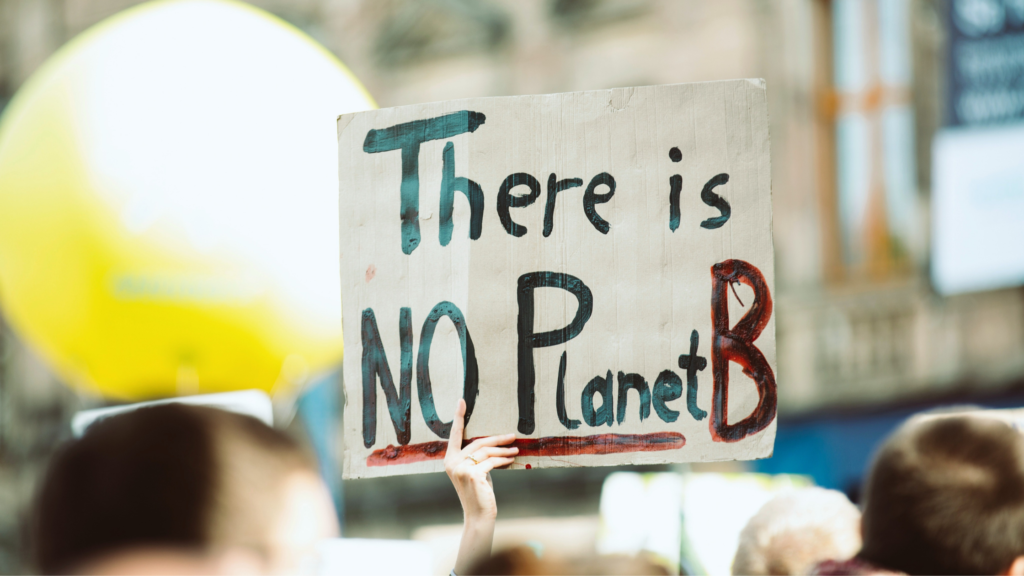
What are the symptoms and consequences of eco-anxiety?
Mental health professionals are noticing an increase in public concern about the climate emergency. A 2020 survey of child psychologists found that over half of medical professionals are seeing patients suffering from climate-related anxiety, a condition said to be “profoundly affecting huge numbers of these young people round the world.” And these worries are manifesting themselves in numerous physical and mental symptoms. Anxieties about the current climate crisis have been linked to a number of mental health issues, including anxiety, depression, anger, panic attacks, and post-traumatic stress disorder (PTSD). Eco-anxiety may cause some people to struggle sleeping at night, while others could experience heart palpitations, or fall into deep cycles of depression. Symptoms vary immensely between individuals.
Research indicates that many young people are already altering their life choices due to fears about environmental damage. A report published this September found that four in ten young people are hesitant to have children due to concerns about the climate. This reflects the long-term vision of environmental doom. However, it’s important to note that the immediate consequences of climate breakdown can also cause psychological distress and anxiety, notably extreme weather, damage to community groups, impeded access to food and drink, and reduced medical supplies. And understandably, the more exposed to these risks you are, the more likely it is that you might face some form of eco-anxiety.
Who is affected by eco-anxiety?
As you might expect, climate change anxiety does not affect all people equally. Those whose livelihoods revolve around nature and the environment, or those who live in areas that are more affected by extreme weather changes (e.g. coastal communities), are more likely to feel the negative impacts of eco-anxiety. A survey by Humboldt State University in California found that the countries with the highest proportion of respondents who felt ‘very worried’ or ‘extremely worried’ about the impact of climate change were the Philippines (84%), India (68%) and Brazil (67%), all nations that are already being hit heavily by environmental breakdown.
Displaced people, refugees, and those on lower incomes are also all more prone to anxiety about the planet because their ability to negate the impacts of the environmental crisis are lesser. As previously mentioned, young people are also far more likely to feel eco-anxiety, because they will be the ones having to deal with the worst consequences of it. This is why inspiring young activists, such as Greta Thunberg, have played such a fundamental role in raising people’s awareness of climate change across the globe.
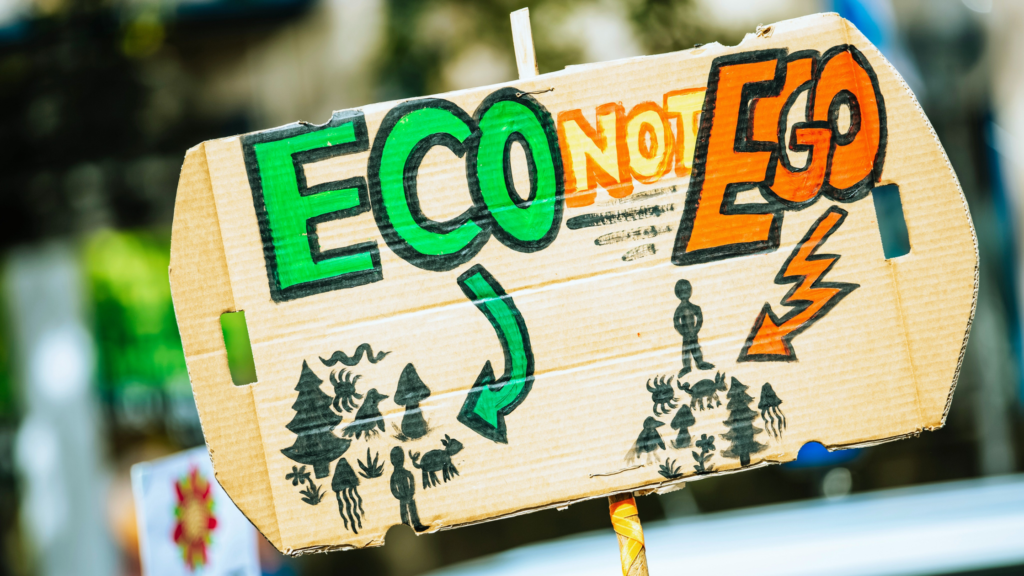
How to overcome eco-anxiety
The first thing you should remember is that it’s perfectly normal to feel sad, anxious, angry, frustrated, or helpless about things that are outside your control, and that remains the case when it comes to environmental issues. Reduced feelings of autonomy and control can lead some people to spiral and start feeling hopeless. However, even though the scale of the task may seem enormous, there are various things you can do to help yourself cope with eco-anxiety.
It’s important to recognise that there are two sides to this; taking steps and actions to reduce your impact on the environment and campaign for a greener world, and implementing activities and techniques to try to maintain your mental health and deal with the everyday psychological effects of climate anxiety. Both elements are essential to reaching a healthier state of mind, in which you’re less bogged down by the depressing news cycles and more energised to take positive steps. So, we’ve come up with ten top tips for dealing with eco-anxiety, incorporating the best advice and methods mindfulness has to offer, as well as listing some other practical solutions to take into your daily life.
Ten top tips for coping with eco-anxiety
- Practice acceptance, not denial – Accept that you can’t change the world on your own, only your tiny role within it. Thinking about how small and insignificant humans are in the context of the whole universe can help stop us from getting overwhelmed by problems. So recognise your ability to influence your own actions, but accept that the world is the way it is.
- Try not to feel responsible for others – Focusing on others can be incredibly mentally draining. It can also distract you from your own actions and goals. Rather than entertaining feelings of guilt or responsible for how others are behaving, try to concentrate on your own journey. Often, preaching to people and making them feel bad about their response to the climate crisis will do nothing but alienate them. Instead, ask people why they might not be concerned, engage with them and their values, and try to generate calm, informative discussions. Having these conversations can also combat feelings of powerlessness.
- Seek out positivity – Try to create positive mental visions of the future. The distressing natural disasters that dominate headlines can often demotivate people and make them feel as if nothing useful can be done, and understandably so. By trying to cultivate positive images of the future, we can counter this and give ourselves the energy to fight for change. Think what it would be like to live in a world run entirely on renewable energies, with sustainable food production and no battery farming, overfishing or deforestation. Seek out positive stories about the environment which can provide hope for the future, such as Costa Rica’s near-elimination of non-renewable energy sources or the Welsh government’s mission to build an enormous National Forest.
- Manage your use of social media – This one relates to the point above, in that social media and depressing world news can both have serious mental health effects. Try to limit the time you spend on Twitter, Instagram or TikTok, perhaps turning off notifications, because it can be very overwhelming. It’s important to stay informed, but it’s equally vital to get the balance right – avoid Doomscrolling and constantly consuming bad news, as it’s likely to just get you down.
- Get active and explore the outdoors – Exercise is a great way to relieve anxiety and enhance your physical health. By finding green space and being active outdoors, you can combine this activity with a greater appreciation of nature. Natural spaces can provide great comfort and peace, while walking, running, and cycling benefits both you and the planet. Cutting down on your use of fossil fuel-run cars or taxis is an easy step you can take towards a more environmentally friendly daily life. If you can’t get somewhere on foot, try to use public transport wherever possible.
- Reduce your carbon footprint – Ultimately, no real change can be made unless governments take action. However, making serious efforts to reduce your carbon footprint will help you feel as though you’re doing your bit, which can in turn reduce eco-anxiety. Take pride in lifestyle changes that you make to reduce waste or cut down emissions, however big or small. If you take a flight, try carbon offsetting. This means measuring the CO2 produced by each flight and investing in a project which reduces CO2 levels by the same amount, thus counteracting the environmental impact of your flight. This guide to carbon offsetting offers a more comprehensive look at how it all works. Other projects like Ecologi allow users to reduce their carbon footprint through tree-planting and other schemes.
- Think about your personal values – Ask yourself what you consider deeply important, and consider how you can implement those values in your personal life. This will set you on the path towards intentional living [include link to site when published]. Thinking about our personal values can direct us towards the accomplishable things in the here and now, rather than large, overwhelming objectives in the distant future. Constantly striving to achieve goals, one after the other, can be exhausting. Living life based on values (for instance, calculating and trying to impact your carbon footprint) is far more rewarding, and likely to decrease your anxiety and stress levels.
- Find a community – We all know that talking to others about our problems is one of the best things we can do to solve them. Take this advice on board when it comes to your concerns about climate change! Find people to speak to, online and offline, join activist groups, donate to causes and use your relationships with others to take positive collective action.
- Tackle anxiety with breathwork exercises – There are a number of breathwork techniques that can be used to reduce stress and anxiety levels. Breathwork is particularly useful in the heat of the moment, when you’re experiencing acute anxiety or discomfort, and it can help to settle the mind and reset. Square breathing, also known as box breathing, is one method that can be useful. For more information, check out our article on the subject.
- Build resilience – Remember, it’s perfectly normal to feel stressed, fearful or anxious about the world around you. What matters is building resilience to these negative feelings, by being mindful, making achievable goals and moving steadily towards them, and fostering caring, trusting relationships that provide support, encouragement and motivation. For a proven technique for developing resilience, read our article on overcoming challenges by treating the obstacle as the path.
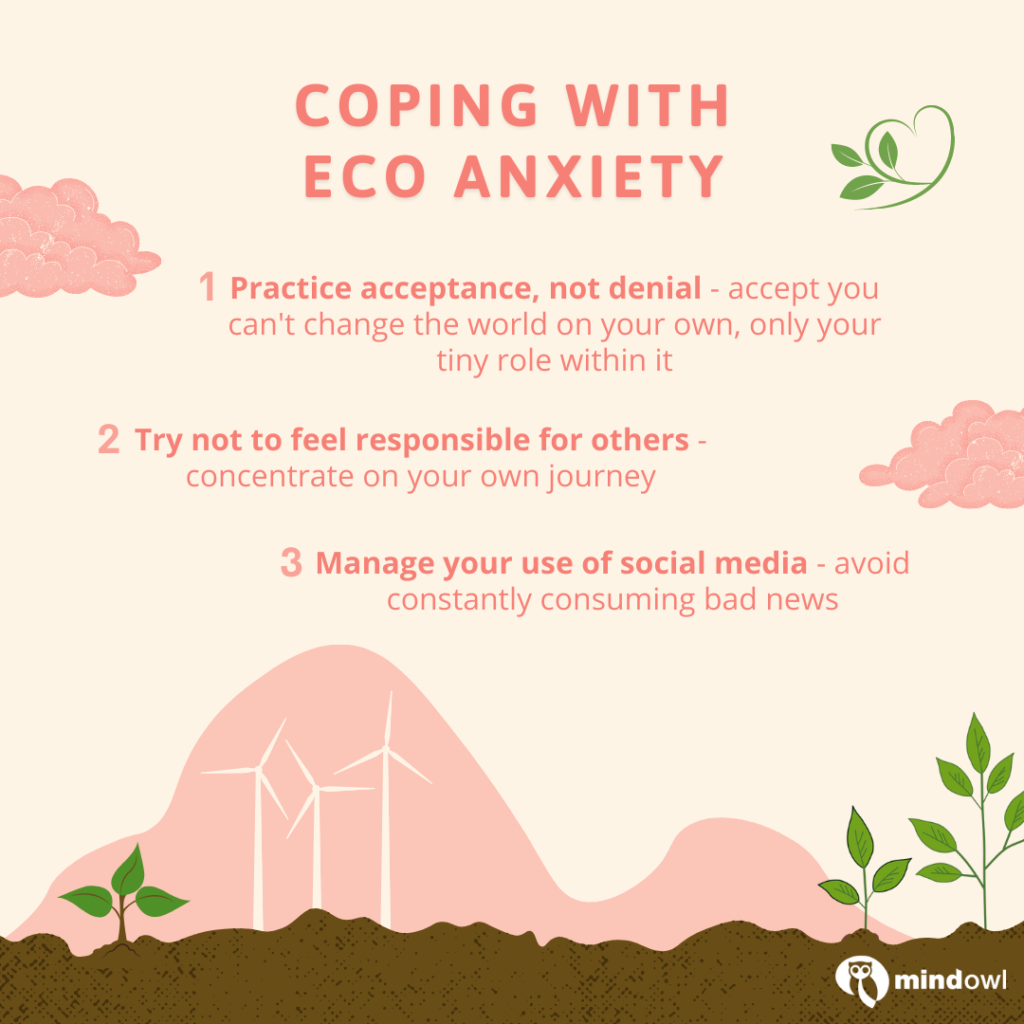
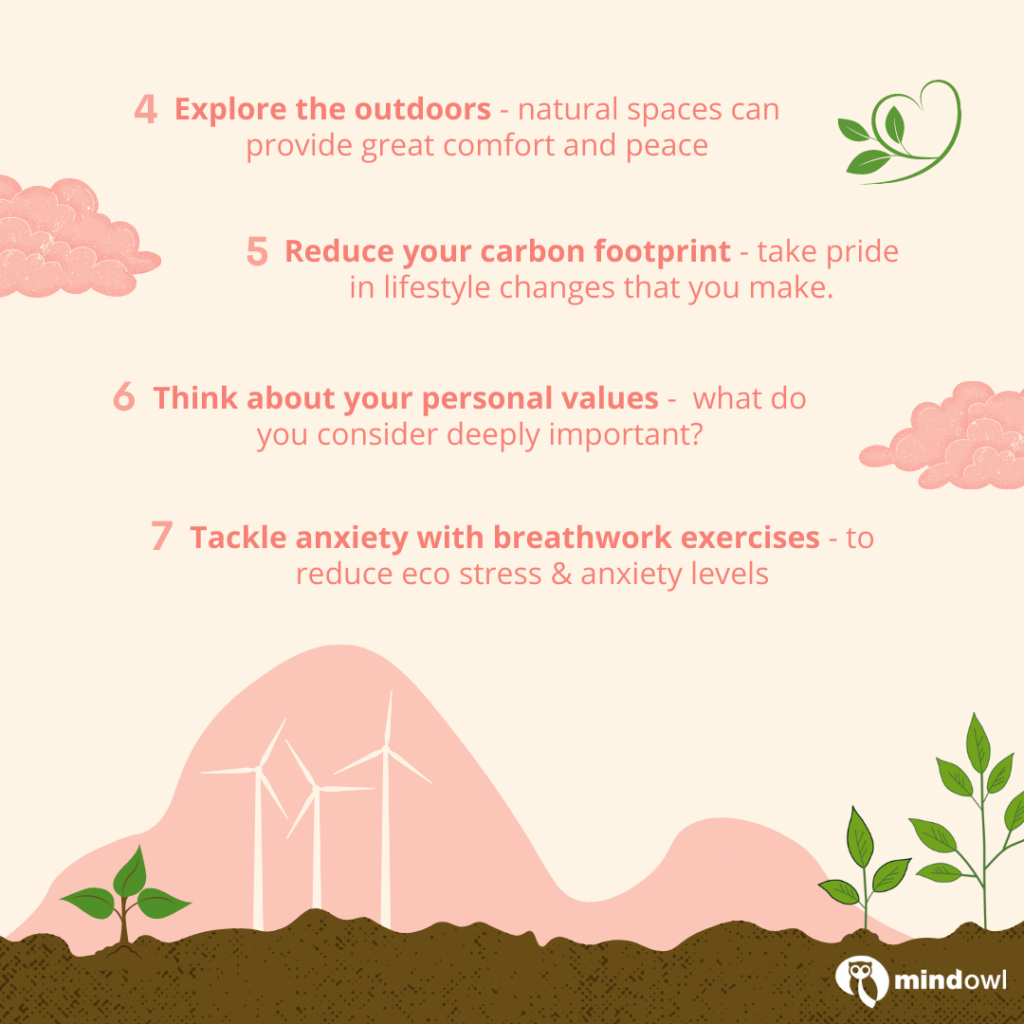
How mindfulness can help you overcome eco-anxiety
As these tips highlight, mindfulness can be an invaluable tool for coping with climate change anxiety. Whether it’s using square breathing or mantra meditation to calm yourself in difficult moments, thinking more closely about your personal values and aims, or simply being more mindful of the amount of food, energy or plastic you waste, mindfulness can be key to dealing with the effects of climate change on the individual.
Try to remember that eco-anxiety is fundamentally a form of empathy and compassion for the world around you – it’s perfectly natural for us to have emotional responses to the very real threat facing the planet. Over the years, we are all personally affected by environmental disasters and changes we see around us, whether it be increased rainfall or higher temperatures, or experiences of more extreme climate events, such as flooding or hurricanes. Try to channel difficult feelings into having positive interactions with nature which nurture this sense of compassion, and share these experiences with like-minded people who feel similarly about the environment. As much as environmental issues are scary, you can’t let them affect every moment of your life, and opportunities for enjoying the natural world still exist all around you!
Even if you don’t feel like eco-anxiety is causing you chronic fear, it’s possible that worries about the world around you can spawn secondary issues like sleep problems, appetite changes, mood disorders, or difficulty concentrating. For that reason, it’s important to try to tackle any problems you may face. Practice acceptance, build resilience, think about and act on your personal values, and try to incorporate mindfulness into your daily life. Taking on board the tips provided in this article can help you improve your mental and physical health and cope better with the potential mental health impacts of climate change.

I graduated from Goldsmiths, University of London with a degree in English, focusing particularly on modern fiction. Since then, I have worked largely as a freelance writer for publications including NME, Resident Advisor, and The Quietus. In addition to my culture journalism, I have produced digital marketing copy, and more recently honed my knowledge of a range of mindfulness-based subjects, allowing me to channel my interest in mental and physical health and inform others about the benefits of meditation and mindful activity.

